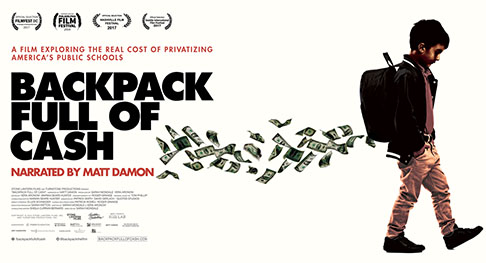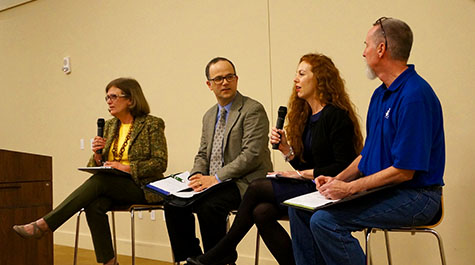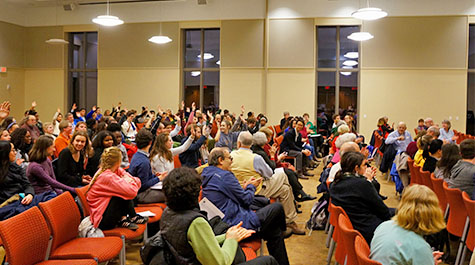Film screening prompts discussion about the future of public education
A screening of “Backpack Full of Cash,” a documentary about the privatization of public schools, inspired a lively discussion last week at the School of Education. More than 200 students, faculty, staff and community members attended the film and panel discussion, which was made possible through a collaboration among the School of Education, the Williamsburg-James City County (WJCC) PTA Council, the League of Women Voters of the Williamsburg Area and the Village.
The film, narrated by Matt Damon, explores the impact of charter schools on the children who rely on them, the majority of whom are from low-income and minority backgrounds. The film aims “to expose the world of corporate-driven education ‘reform’ where public education – starved of resources – hangs in the balance.” It takes viewers through the 2013-14 school year, looking at three cities (Philadelphia, New Orleans and Nashville) which offer charter schools and other privatized options compared to one city that meets high standards of quality for low-income children without charters or vouchers (Union City, New Jersey).
A panel discussion followed the film, moderated by Virginia McLaughlin, Chancellor Professor and former dean of the School of Education. Panelists included Paul Manna, the Isabelle and Jerome E. Hyman Distinguished University Professor of Government; Jackie Rodriguez, assistant professor of special education; and Mychael Willon, chair of the WJCC PTA Council.
Due to their varied backgrounds in education, panel members brought unique perspectives to a discussion about the controversial and compelling positions the film presented. Panelists described the film as a counterpoint to “Waiting for Superman,” a 2010 documentary that examines issues in public education and follows the stories of five students striving for admission into charter schools.
Citing the complexity of the issues, panelists encouraged the audience to do additional research on both sides of the debate to form their own opinions.
Manna noted that with the many complex and interconnected challenges in providing public education, a one-size-fits-all solution is impossible and overly simplistic. “Ending school choice, as the film advocates, is not really a solution,” he explained, “because it doesn’t solve any of the underlying problems that charter schools and vouchers were created to address in the first place.”
While the panel agreed that more generous funding for facilities, programs and resources go a long way in addressing some of the issues that public schools wrestle with, Rodriguez noted that supporting teachers was also a crucial part of the equation.
“When teachers do not feel valued, they don’t have an incentive to work in public schools, especially those in low-income areas with our most vulnerable students,” she said. “And we’re seeing this play out with crisis levels of teacher shortages in schools all across America.”
In response to questions from the audience about the current pessimism around the future of public schools, Rodriguez offered that “We are pointing the finger at public school teachers and at public schools, making them the scapegoat for long-standing and debilitating funding inequities. We should be equitably reinvesting our public funds into our public schools, not seeking school reform through exclusionary voucher and choice systems, especially when these systems are not held accountable to federal laws like IDEA, which protects students with disabilities in our public schools.”
This idea resonated with Anna Wong ’17, who is now pursuing her master’s degree in English Education. “I want to help bring communities together and heal the rifts of the past,” she shared. “As a pre-service English teacher, I want to help end that cycle of scapegoats – because I think of narratives as positive, lasting change are not driven by blame.”
Wong cited the words of one young girl in the film, who said “I need to play my violin like peanut butter needs jelly. I need art like a tree needs leaves.”
“This kind of peanut-butter-and-jelly, trees-with-leaves education is what I dream of providing children,” said Wong. “This film screening, and the discussion that followed, was a heartening reminder that in this community, my dream is valued and supported.”

